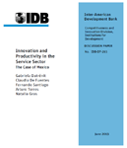Innovation and Productivity in the Service Sector: The Case of Mexico
Date
Jun 2013
An extensive literature analyzes the determinants of research and development (R&D) and the impacts of R&D on firms' innovation performance and productivity. Because most available studies focus on manufacturing firms, very little is known about firms in the service sector. The gap is even more noticeable in the case of service firms in developing countries. Based on data from the latest available Mexican innovation survey, we explore the determinants of-including the barriers to-technological innovation and the impact of innovation on service firms' productivity in Mexico. Results from a three-stage econometric model indicate that firms' structural and behavioral factors, such as size, openness strategy, use of public funds, and exporting behavior, increase the propensity to invest in innovation. The results also show that firms with higher learning and innovation intensity tend to show superior innovation performance compared to firms that invest poorly in learning and innovation. Moreover, innovation output has a positive impact on firm productivity. In terms of policy implications, this study highlights the importance of promoting learning and innovation as the basis for improved productivity of service firms in Mexico. Specifically, policy interventions need to enhance both the number of service firms that innovate and the intensity of those innovation activities.



